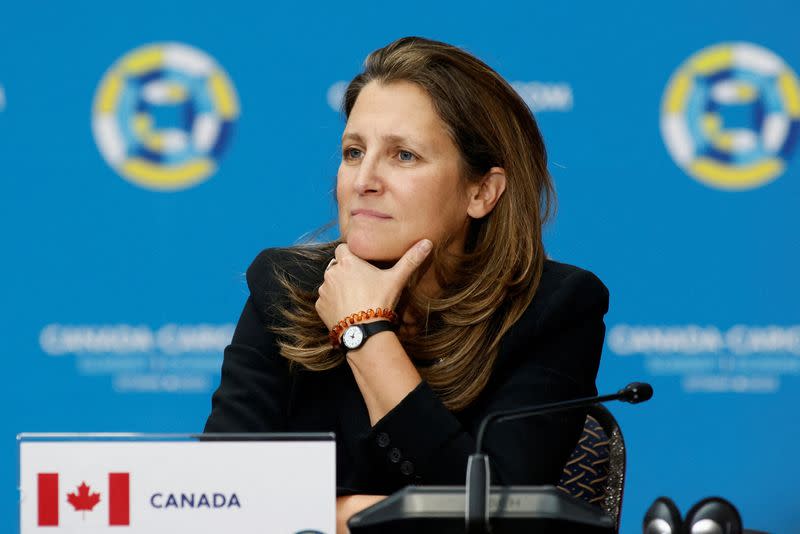Canada fiscal update sees higher deficits and debt, launches housing and green measures

By Steve Scherer
OTTAWA (Reuters) - Canada's deficit spending will be much higher than forecast in March and its debt will come down more slowly, the finance ministry said on Tuesday in its mid-year fiscal update, as it pledged new measures to boost housing supply.
With interest rates at a two-decade high and inflation still elevated, Prime Minister Justin Trudeau's Liberal government is under pressure to curb spending, which the central bank warned is stoking inflation.
While analysts said the spending on housing and on green tech subsidies would ultimately be disinflationary, they expressed concern that the government was not showing enough restraint as debt servicing costs skyrocket.
The fiscal year 2024/25 and 2025/26 deficits will be much higher than had been forecast. The deficit is seen at C$38.4 billion in 2024/25 and C$38.3 billion in 2025/26, compared with March estimates of C$35.0 billion and C$26.8 billion respectively.
The federal debt-to-GDP ratio will rise in 2024/25 for a second consecutive year to 42.7% before it begins declining, a year later than had been previously forecast.
"They're pushing back the beginning of the debt decline," said Robert Asselin, senior vice president of policy at the Busines Council of Canada. "That suggest to me they're not on a sustainable fiscal track and they need to rein in their spending."
The finance ministry has said it targets a declining federal debt-to-GDP ratio in the medium term as a fiscal anchor. In the Fall Economic Statement (FES), the government pledged to ensure the ratio stayed on a downward track after 2024/25.
"The government recognizes it is constrained in how much it can spend, but it's spending up to that line all the time," said Randall Bartlett, an economist at Desjardins Group. "To me that doesn't speak to prudence."
On the growth side, the government uses a median of market forecasts from September, which do not project a recession, but they do see real GDP growth next year at just 0.4%, much lower than the March budget projection of 1.5%.
The Bank of Canada hiked rates to a 22-year high of 5.00% between March of last year and July of this year. It has since held them steady, but warned that they could go higher if inflation - at 3.1% in October - does not come down to its 2% target.
The FES sees debt servicing costs in 2024/25 at C$52.4 compared with C$46.0 billion forecast in the March budget, and in 2025/26 they will total C$53.3 versus C$46.6 in the budget.
As Canadians struggle with higher living costs, housing affordability has emerged as the main criticism against the government. That is one of the reasons opinion polls show Trudeau badly trailing his main rival, Conservative leader Pierre Poilievre. An election is not due until 2025.
Finance Minister Chrystia Freeland said she understood that after three tough years that Canadians were worn out and frustrated.
"What Canadians deserve today is for us to address the very real pain that so many are feeling," she said in prepared remarks to legislators.
The FES includes a number of measures aimed at boosting housing supply, including C$15 billion in new loan financing from 2025/26 to spur apartment construction, an extra C$1 billion over three years to fund dedicated to building affordable housing, and new mortgage rules for lenders dealing with homeowners at risk amid high interest rates.
It also commits to clamping down on short-term rental companies like AirBnB by denying income tax deductions incurred to make money from short-term rentals in provinces where such the practice is illegal.
The FES commits to a timeline for promised investment tax credits (ITCs) for clean energy and technologies, as previously reported by Reuters.
The government will send legislation to parliament this month to start paying subsidies for carbon capture and net-zero energy projects, part of a plan to help the country spur green investment and compete with the United States.
Legislation to fund the remaining ITCs will be sent to parliament during the course of 2024.
($1 = 1.3718 Canadian dollars)
(Reporting by Steve Scherer in Ottawa; Editing by Matthew Lewis and Franklin Paul)

 Yahoo Finance
Yahoo Finance 